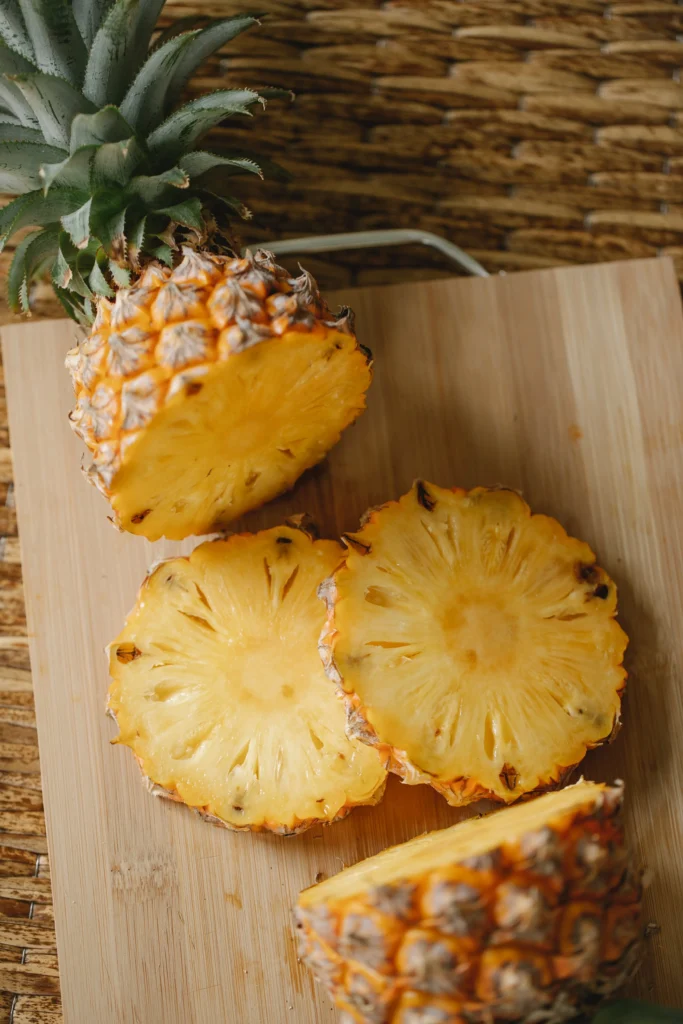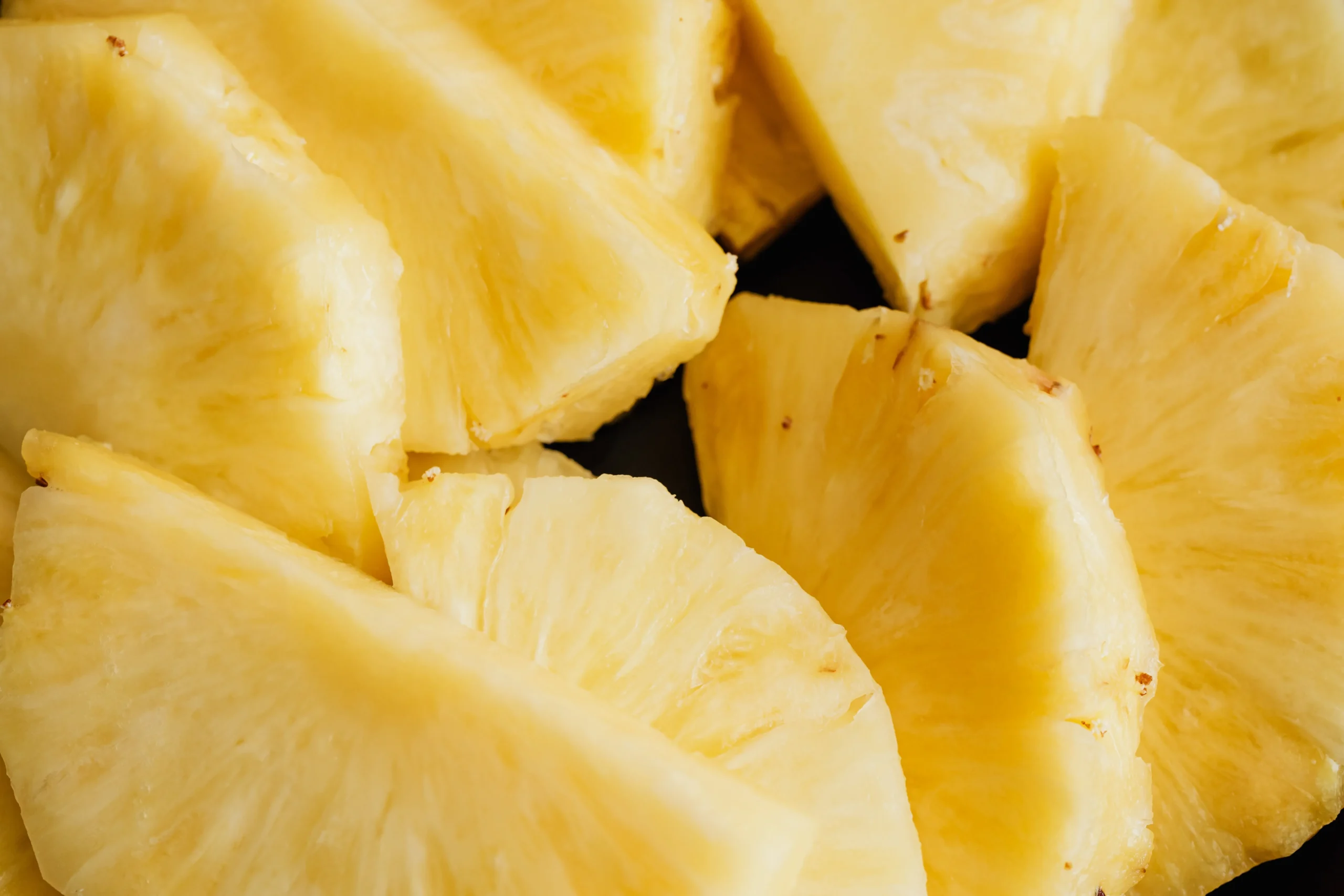Pineapple Good For Diabetics
Pineapple good for diabetics, you’re in luck if you like the tropical sweetness of pineapple yet have diabetes! You may still have fruits like pineapple in your diet, despite what the general public believes. Pineapple does naturally include sugars and carbohydrates that may have an impact on blood sugar levels, however moderation and careful eating are key.
Pineapple Good For Diabetics Knowing Your Glycemic Index
Gaining an understanding of the glycemic index (GI) is essential for managing diabetes. On the GI scale, pineapple rates 59 when it is fresh, placing it in the moderate category. This indicates that while it’s not as high as some fruits, like watermelon, portion control is still necessary. To minimize added sugars, it may be preferable to choose canned pineapple in its natural juice or unsweetened pineapple juice.
Making Wise Decisions
Pineapple Good For Diabetics, can still be a tasty and diabetes-friendly ingredient in meals. Fruits high in protein, such as Greek yogurt or low-fat cottage cheese, can counteract the effects of pineapple on blood sugar levels. Pinch of pineapple, whether as a snack or as part of a savory dish, can give your diet a tropical flavor without sacrificing your diabetic control objectives.
7 Health Benefits of Regular Pineapple Consumption. Worldwide Growth, Health Benefits, and Best Varieties
Pineapple, with its tropical allure and sweet-tart flavour, stands as a nutritional powerhouse that transcends cultural boundaries. Not only does this exotic fruit delight taste buds, but it also boasts an impressive array of health benefits. From immune system support to digestive health, pineapple’s appeal lies not only in its taste but in its contributions to overall well-being.
Vitamin Rich Properties :
Pineapple’s allure extends beyond its taste to a nutritional profile rich in essential vitamins, minerals, and enzymes. Renowned for its high vitamin C content, this fruit serves as a potent antioxidant, aiding in immune system enhancement and promoting skin health. Additionally, pineapple provides ample amounts of manganese, crucial for bone health and energy production. Its inclusion of vitamin B6, thiamine, riboflavin, and folate further cement its status as a well-rounded nutritional gem.
Anti-Inflammatory Properties:
Central to pineapple’s health benefits is bromelain, a mix of proteolytic enzymes. This compound lends the fruit potent anti-inflammatory properties, potentially reducing inflammation associated with conditions like arthritis. By making pineapple a regular part of your diet, you may find a natural and flavoursome ally in the management of inflammatory disorders.

Digestive Health:
Pineapple Good For Diabetics, contribution to digestive health is multifaceted, thanks to its soluble and insoluble fibres. Soluble fibre stabilizes blood sugar levels and lowers cholesterol, while insoluble fibre adds bulk to stool, preventing constipation and promoting regular bowel movements. The enzyme bromelain further aids digestion by breaking down proteins. Incorporating pineapple into your diet can foster a healthy digestive system, addressing common gastrointestinal concerns.
Boosting Immunity:
The robust vitamin C content in pineapple positions it as a potent immune system booster. This essential vitamin facilitates the production of white blood cells, key players in the body’s defence against infections and illnesses. Regular pineapple consumption can fortify the immune system, providing a natural defence against common colds and infections.
Eye Health:
Pineapple’s beta-carotene content, a precursor to vitamin A, contributes to maintaining healthy vision. Vitamin A is recognized for its role in preventing age-related macular degeneration and other eye-related issues. By embracing pineapple, you provide your eyes with the essential nutrients needed for optimal functioning, potentially reducing the risk of vision problems as you age.
Weight Management:
For those navigating weight management, pineapple offers a delicious and nutritious addition to the diet. Its natural sweetness satisfies sweet cravings, and the fibre content promotes a feeling of fullness, potentially reducing overall calorie intake. However, moderation is crucial due to the natural sugars present, ensuring a balanced and health-conscious approach to consumption.
Hydration and Electrolyte Balance:
Pineapple’s high-water content contributes to overall hydration, vital for various bodily functions. Additionally, the fruit contains essential electrolytes like potassium, regulating fluid balance, muscle contractions, and nerve signals. By integrating pineapple into your diet, you not only indulge in its delightful taste but also maintain hydration and electrolyte balance naturally.
Skin Health:
The combination of vitamin C, manganese, and antioxidants in pineapple promotes healthy and radiant skin. Vitamin C plays a vital role in collagen synthesis, a protein crucial for skin structure, while antioxidants protect against oxidative stress and premature aging. By incorporating pineapple into your diet, you support a natural glow and enhance skin elasticity.

Global Growth and Presence in India:
Pineapple is cultivated worldwide in tropical and subtropical regions. The major global producers include Costa Rica, the Philippines, Thailand, and Indonesia. In India, pineapple cultivation thrives in states like West Bengal, Karnataka, Kerala, and Andhra Pradesh. The tropical climate of these regions provides an ideal environment for pineapple growth.
Varieties and Preferences:
Several pineapple varieties exist, with the two most common being the Smooth Cayenne and Queen Victoria. The Smooth Cayenne is known for its sweetness, juiciness, and vibrant aroma, making it a popular choice for fresh consumption and juicing. The Queen Victoria, on the other hand, is prized for its compact size and intense flavour, often preferred for canning and processing.
Pineapple’s global appeal is not only rooted in its diverse and delectable taste but also in its remarkable contributions to health and well-being. Whether you savour its golden sweetness for its immune-boosting properties, digestive support, or skin-enhancing benefits, pineapple emerges as a holistic addition to a balanced diet. As you embark on this flavourful journey, explore the diverse varieties available globally, and relish the golden goodness that pineapple brings to your table.
Common FAQ
Is pineapple good for a diabetic?
Pineapple Good For Diabetics can be consumed in moderation as part of a healthy, balanced diet if you have diabetes. Select sugar-free pineapple—either fresh or canned—and stay away from sweet syrups, rinsing it off before consumption.
What is the best fruit for diabetics?
The top five fruits for diabetics are shown below.
- berries. Berries are some of the healthiest fruits you can consume; examples are blueberries, raspberries, and blackberries.
- Avocados. Being heavy in fat and low in carbohydrates makes avocados a special kind of fruit.
- Citrus Fruits.
- Apples.
- Pomegranates.
Is pineapple juice high in sugar?
It’s crucial to keep in mind that pineapple juice is still heavy in sugar and poor in fiber, even with its possible health benefits. It won’t likely satisfy your hunger as much as consuming the same amount of raw pineapple, according to this. As such, it might encourage weight gain in certain individuals.
Does pineapple raise blood sugar?
A pineapple slice weighing 85g has a maximum of 8.3g of natural sugars. Because of its straightforward structure, this kind of sugar is absorbed and digested by the body more quickly than other carbs, which causes a spike in blood sugar levels shortly after meals.
What fruits should diabetics avoid?
On the other hand, fruits that are poor in fiber and high in sugar are the worst for diabetics. These consist of dried fruit such apricots and raisins, as well as grapes, bananas, and mangoes.
Is pineapple high in insulin?
He did note, though, that pineapple has a greater effect on blood sugar than certain other fruits. It must therefore be ingested in moderation. Pineapple has a moderate glycemic index, ranging from 51 to 73. “Pineapple consumption should not exceed 100 grams per day as excessive consumption may elevate blood sugar levels.
You may also Read our Finance, World News, Local News, Health, Food, and Education articles.
খাসটাইমস বাংলা সম্পর্কে আরও বিস্তারিত ও নতুন খবর জানতে ক্লিক করুন। সব ধরনের ব্রেকিং, আপডেট এবং বিশ্লেষণ সবার প্রথম বাংলায় পড়তে ক্লিক করুন।

